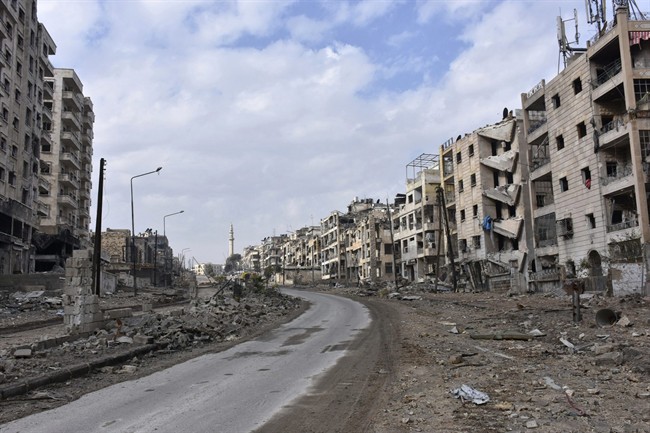Syrian rebels shelled Aleppo and air strikes resumed around the city on Friday as Syrian President Bashar al-Assad and his allies said the insurgents’ withdrawal from the city could pave the way toward a political solution for the country.

A day after the last rebels left their remaining pocket of territory in the city, the Syrian Observatory for Human Rights – a war monitor based in Britain – said about 10 shells fell in its southwestern al-Hamdaniya district.
READ MORE: Recapture of Aleppo by Syrian government marks end of brutal chapter in civil war
The Observatory said six people, including two children, were killed. State television said at least three people died.
Insurgents seeking to oust Assad have shelled government controlled areas of Aleppo throughout the conflict, which began in 2011. The destruction in those parts of the city has been far less than in eastern districts rebels held until this month.
Air strikes resumed in rebel-held areas of the countryside near Aleppo on Friday for the first time since the end of the evacuation operation.
VIDEO: Aleppo evacuees cry as pro-Assad media report city back under government control

Strikes hit to the west, south-west and south of the city, areas which had not been hit for at least a week. The Britain-based Observatory had no information on casualties yet.

Get breaking National news
After months of bombardment and a final few weeks of intense air strikes and Syrian army advances on the besieged, rebel-held part of Aleppo, a local ceasefire was reached on Dec. 15 which allowed thousand of civilians and then fighters to leave.
The last left the city late on Thursday for countryside immediately to the west. The International Committee of the Red Cross said about 35,000 people, mostly civilians, had departed.
VIDEO: Holocaust survivors standing in solidarity with Syrians in Aleppo

Many of those who left are living as refugees in the areas to the west and south of Aleppo, including in Idlib province where bulldozers were used to clear heavy snowfall on Friday morning, the opposition Orient television showed.
On Friday, the army and its allies, including Lebanese group Hezbollah, searched districts abandoned by the rebels, to clear them of mines and other dangers, the Observatory reported.
State television showed empty streets lined with apartment blocks smashed by air strikes in the al-Ansari district.
DAMASCUS WATER CUT
In the capital Damascus, the water authority has been forced to cut supplies coming into the Syrian capital for a few days and use reserves instead after rebels polluted the water with diesel, it said on Friday.
The al-Fija spring which supplies Damascus with water is in the rebel-held Wadi Barada valley northwest of the capital in a mountainous area near the Lebanese border.
The government controls much of the surrounding territory and on Friday carried out aerial attacks and shelled the rebel-held area, the Syrian Observatory for Human Rights said.
READ MORE: Syrian military says Aleppo evacuations complete, ending 4-year rebel hold on city
A military news outlet run by Hezbollah said the rebels in the valley had refused to leave the area and the Syrian Arab Army began an offensive against them on Friday morning.
Through a series of so-called settlement agreements and army offensives, the Syrian government, backed by Russian air power and Iran-backed militias, has been steadily suppressing armed opposition around the capital.
PEACE TALKS?
During the long struggle to re-take Aleppo, Assad’s forces were supported by heavy Russian air strikes, Iran-backed militias and fighters from Iran-backed Shi’ite Hezbollah.
On Friday, Assad thanked Russian President Vladimir Putin for having been Syria’s main partner in the battle, and said the city’s fall had opened the door to a political process.
Putin said Russia, Iran, Turkey and Assad had agreed the Kazakh capital of Astana should be the venue for new peace negotiations, and Hezbollah leader Sayyed Hassan Nasrallah said the defeat of the rebels in the city could pave the way to a political solution.
READ MORE: Putin expresses interest in visiting Trump, covers other issues in year-end conference
Turkey backs rebels fighting Assad and Islamic State.
United Nations-backed peace talks in Geneva broke down earlier this year as violence escalated, particularly around Aleppo.







Comments
Want to discuss? Please read our Commenting Policy first.